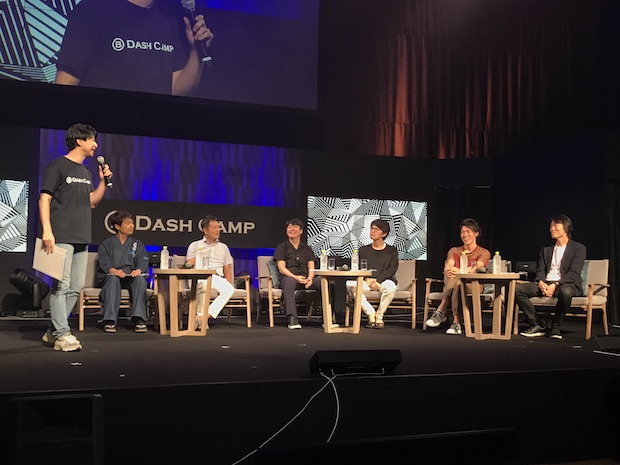
See the original story in Japanese.
Japanese outstanding VC firm B Dash Ventures held its flagship semi-annual conference B Dash Camp 2018 Fall in Fukuoka from October 3rd to 5th. 16 startups which passed document examination participated in the preliminary of Pitch Arena, and 6 teams were chosen for finalists. The top prize went to Aeronext, a startup developing next-gen drone technologies.

This article introduces the finalists and their pitches. The judges for the final round of Pitch Arena were as follows:
- Kotaro Chiba (Investor / Drone Fund)
- Shinji Kimura (AnyPay)
- Taichi Murakami (Livesense)
- Yusuke Sato (Hey)
- Genki Shiota (Akatsuki)
- Ken Tamagawa (Soracom)
Top Prize / PERSOL Award winner: Aeronext


Aeronext develops next-gen drone technologies. Using its own technology called 4D Gravity, the firm had launched drone products optimized for various use cases: Next VR optimized for 360-degree VR photographing, Next DELIVERY specialized in delivery services and Next INDUSTRY available for infrastructure inspection, surveying, security and agriculture.

By improving drone airframes from hardware perspective, these products acquired significant technical superiority in body axis stability or high-speed flight. The firm aims a business scaling-up by founding joint ventures in cooperate with major companies specialized in each use case. Currently, the firm is developing Next VTOL, the airplane capable of vertical take-off and landing with fixed wings utilizing its own multicopter technologies.
They fundraised from Drone Fund in May of last year.
2nd Place / Lexus Award winner: Medulla by Sparty


Sparty provides the hair-care brand Medulla for female users, allowing periodical purchase of shampoo and hair treatment customizable in accordance with hair quality and condition. The shampoo market in Japan is formed with many varieties and even the most popular product can acquire only 5% of the share. The firm expects that the next trend in the shampoo market must be personalization and launched this service in May 22nd.

Just answering to seven questions, users can periodically receive optimal shampoo and hair treatment chosen from among more than 100 recipes. The firm aims to encourage an innovation in the data-driven hair-care market. It currently has six demonstration spots within Tokyo are and is going to expand them nationwide through cooperation with hair-salons.
Jobcan Award winner: Kuraseru by Kuraseru

When an inpatient who is hardly treated by home medical care leaves hospital, social workers or care managers in hospital have to look for a nursing facility which can accept him. Kuraseru develops and manages the hospital-leaving arrangement SaaS (Software as a Service) Kuraseru targeting social workers and care managers.

These procedures are currently done by phone and facsimile, and Kuraseru aims to improve the efficacy of the work by replacing all these procedures. The firm had fundraised 50 million yen (about $450,000) from 500 Startups Japan in June.
600 by 600

600 is the refrigerator-based drink / convenience goods sales service. It is, so to speak, the free convenience store for offices, hospital, or apartment houses. All goods have IC tags attached, and the refrigerator detects which goods were picked and then calculates the price automatically triggered by opening and closing the door. Purchasers pay for them by swiping credit cards to reader on the door.

The firm had officially launched the service this June and commenced a new integrated service of storage / unmanned convenience store from this month. 600 replenishes commodity goods in the refrigerator twice a week and also provides a concierge service; users can purchase their favorites items from among 600 items by requesting through a chat tool in advance.
The firm had fundraised from Apricot Ventures back in June.
Ginco by Ginco

Ginco developed the wallet app under the same name available for multiple cryptocurrency. Not a few users in Japan deposit cryptocurrency to the exchange and leave it untreated, but Ginco suggests that users should own and manage their cryptocurrency by themselves to secure safety. Since its launch back in April 2018, the app has been downloaded more than 30,000 times, and the total dealt amount on the app comes to more than 3 billion yen (about $27 million).

The firm monetizes the app through customer transferring to various services where cryptocurrency is available. The firm added DEX (Decentralized Exchange) function enabling overseas users to trade tokens between users on Ginco and plans to launch hardware wallet next year too.
The firm fundraised 150 million yen (about $1.3 million) from Global Brain.
Choole by Rexit

Rexit provides the bridal reservation support platform Choole, allowing couples about to be married to choose wedding dress, hair-do, photographer, videographer and wedding hall. The choice of wedding dress or flowers is generally narrow because bridal item providers are tied up with each wedding hall, but Choole enables users to order to any provider directly and hold ceremonies in at reasonable price.

Since its launch back this June, more than 130 wedding halls have participated in this platform. The firm fundraised 55 million yen ($490,000) from Shinichiro Sugiyama (CEO of Valetudo), Genki Arai (CEO of Happy Element) and individual investors.
Translated by Taijiro Takeda
Edited by “Tex” Pomeroy







































